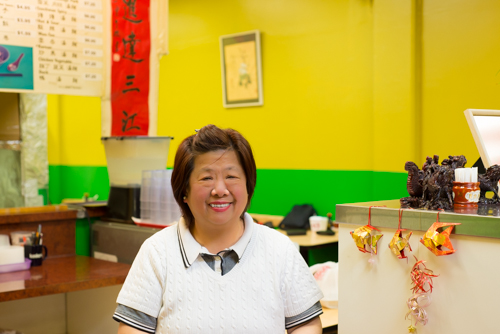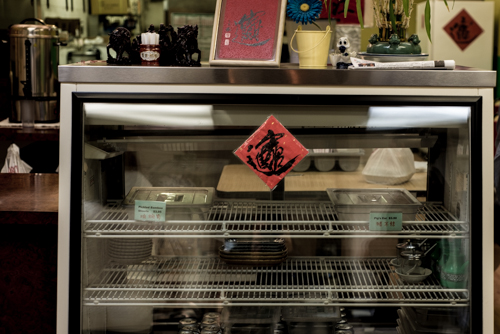
Wendy Lu, on the final night at Green Village in Seattle’s International District.
“You’ll tell them, right?” Wendy asked toward the end of the evening. She motioned toward the outside world, as if to remind us that there were still other people out there. We were the only guests in the tiny Chinese restaurant tonight. She looked out the window at another customer pulling at the locked door. “I don’t have the heart.” We nodded, reassuringly; we’d tell the world—the Internet—that Green Village was no more. Let people read what Wendy wouldn’t or couldn’t say to their face, what she shared with us tonight inside the restaurant: Green Village, the restaurant that had been her life for decades, was closing so that she could live her life.
The theme of the night was journeys, traveling to freedom, from the dark to the light. It was scheduled by a Jewish young adult group, an alternative way to think about the themes of the upcoming Passover holiday. The meal started out light-hearted: comparing Judaism and Chinese culture. Two lunar calendars, we learned as we dug into piles of fried rice, each with a double month this year. Wendy ran through the Chinese holidays and how they are celebrated. “We give red envelopes with money, do you have that?” Over sweet-and-sour chicken, someone explained the concept of Chanukah gelt
Wendy shook her head at first, when encouraged to tell her story. The story we had originally, ostensibly, come to hear. “What should I tell about?” Josh, who’d arranged the dinner, nervously pulled up the blogpost that had inspired him to ask her to speak about her journey, to tell the story of coming out of her desert. “What’s it about? Why don’t you just read it instead of me telling it? I don’t know it. I don’t do technology.” She glanced at the phone, then paused and pointed to a photo. “That’s my dad. He passed a year ago. That’s why I don’t want to tell my story.” Her strength sapped momentarily. Sad as it was, she was still sugar-coating it. The table was still strangers. We were still gawkers, onlookers at this point. So she gave us something to gawk at.
“My father painted these,” she pointed to the framed Chinese art around the room. Looking up, I realize that while from eye-level down, the room is the namesake shade—green—topped with a rather hideous yellow, up above there is beauty. Calligraphy, also by Wendy’s father, adorns posters and signs. The menu is framed by his artist’s brushstroke. Wendy wouldn’t tell us the story of her journey, she said. She couldn’t participate in our stories of freedom. But here it was, slipping out, piece by piece, like wontons through inexpertly held chopsticks. “Both my parents were deaf mutes,” she explained. Her father’s art was his expression. The restaurant, though, was his family’s means.
When we first walked in, Wendy asked if we’d been in before. I had, but it was a while ago, before she had closed for a bit. “I’m closing again,” she said, matter-of-factly, as if restaurants that had been open, in some form or another, since 1979, suddenly closed every day. Wendy and her family—her parents and their six children—came to the US when Wendy was 18, settling in Seattle because the weather reminded her mother of Keelung City, where she’d arrived in Taiwan when she’d left China. It was November, and it snowed. Wendy had never seen snow before.
But we were no longer here to hear her story of her journey. No, she wasn’t telling that story tonight. That was a story about the past, and now we were here, a time when family doesn’t matter any more. She ranted about technology, how it’s ruining everything. About the pregnant wife and her husband, who sat, each on their separate phones for an entire lunch. How she doesn’t do computers, how we’re all going to be taken over by robots. Loud music interrupted the rant and she excused herself to answer her smartphone. That, we were coming to learn, was Wendy. Emphatic, enthusiastic, enigmatic, and yet, a realist.
The rant on technology morphed—it wasn’t a rant against technology, it was against busyness. Against not taking the time to stop and care. “I closed the restaurant once before,” she said, “when my son was sick.” The color drained from her cheery cheeks as they drooped, plump meatballs sinking into soup. “He was diagnosed when he was 14. I was neglecting my son’s health because I was taking care of the restaurant.” She could barely choke out the c-word. Cancer. He died of it seven years ago. Later, she tells us of fighting to get to sleep by his side in the ICU. She doesn’t want to tell the story of her journey. But his story is her story, and that, she wants to tell. It’s why she’s leaving the restaurant. It’s why today, she’s sitting at a table with ten strangers, trying not to tell her life story.
“My customers, they were black, white, Mexican, and they came in, and I thought maybe they didn’t have manners. But my son, he taught me that I was in the business of service. He taught me to care for everyone.” If there’s one thing Green Village has a reputation for, it’s treating everyone like family. She’s carried on his legacy admirably. But her next step, the one away from the restaurant he advised her on, might be his most lasting legacy.
“All this time, I work, I work. We had four restaurants at one point,” Wendy continues. Her son’s illness might have been the biggest battle, but it was by no means the only one. One restaurant was in a decrepit building that collapsed. Another location had a fire. Finally, she landed in this spot, her final restaurant, now on its final night.
Her husband, the chef, comes out and, for a moment, her color is back. They make some jokes. He clearly has the same vivacious energy she does, when she’s “on.” He leaves and she goes back to her son, her anger sparking faster and hotter than fire under a wok.
“Why does this happen? The best people, the worst things.” She was laying down serious existential questions about life to a group that was mostly made up of twenty-somethings. “When I move on, when I am there, I want to ask: why? Why would you do this?” She points outward on the word “you,” as she’ll do later when asking us to spread her story. This time, though, the motion doesn’t mean her customers: this time it means a bigger force. We’re no longer onlookers, we’re drawn into the conversation, into the story.
At first, watching the Wendy Lu show was like watching TV. Chinese restaurant owner starts ranting at random customers as she closes down her restaurant on the final night. Was it a sitcom, I wondered? Where everyone hugs at the end and goes for ice cream? Or was it a tragedy, where we step over her ragged body, the tears still wet on the floor. We were on the show now, and we had the power to change the script. A Passover tale turned choose-your-own-adventure.
Wendy was not ranting. She was baring herself. To people she didn’t know. In a way that nobody does anymore. It seemed surreal, like a show, because nobody takes risks like this anymore. But why shouldn’t she take this risk—she’d already taken the other ones. She’d already opened all the restaurants. Now she was closing the last one. This, I told her later, was the real risk. Sharing her story was the easy part.
“I am not a success,” Wendy declares. The silence hangs. A voice from the kitchen shouts in Chinese and Wendy responds, and then says “thank you” in English before continuing. “I failed. I failed at being a mom. I failed. I am not happy.” I am doubtful that anyone in this world has ever been as honest as she is right now, with us. Her descriptions and declarations are bittersweet. They are tinged with the sour flavors of the past, but hint at the sweet of the future. A future in which, for the first time in over three decades, she doesn’t have a restaurant to take care of.

Bam Bam, Wendy’s puppy
Her husband returned with Bam Bam, their one-year-old husky puppy. The story wraps up. The story Wendy Lu wouldn’t tell, the one of her journey, the one of her path from the dark to the light, into freedom. Her Passover story. She wouldn’t tell it because she couldn’t: it was still happening around her. As we gathered our stuff, as she brought us takeout boxes and plastic bags. She prepared to close her restaurant again, her last restaurant, for the last time, but we were a part of her story for the first time. It was the final act, the last chapter. The one where she passes on her oral history. Where she adopts new children to whom to tell her story. Her own eldest gone, her son in Taiwan, her daughter in college in California. She found a new way to pass on her legacy here in Seattle. To different young people.
At one point in the night, she paused from pronouncing her failure and changed her tune for a moment. “We don’t just buy and sell food here,” hints of red crawling into her cheeks, spreading like chili oil poured into a soup. “No, here, we talk. That’s the difference.” In my head, I know tonight is unique, but I wonder what would have happened on another night, if this were another group of people. I banished the thought–this night was not like the other nights. “My customers,” she said, “they’re why I’m here. Everyday, they helped me.” I grew less certain that we were here by chance.
She apologized for not telling her story. She apologized for telling the wrong story. She apologized for telling too much. When Josh, the dinner’s organizer, told her it was great and apologized back at her for such a poor choice of night, Wendy said nothing. But in the most meaningful way. The fluent speaker of Mandarin, Cantonese, and English suddenly spoke the international language of Mastermind. For a fleeting second, just a brief moment, I saw a look on Wendy’s face that told me she knew exactly what she was doing when she locked the ten of us into her empty, closing restaurant tonight. It was not an heirloom of value, just a story and a box, eerie with the crimson glow of sweet and sour chicken, and a Post-it with her information, a promise to call. She wouldn’t let us pay. We said good-bye and left, turning back to watch Wendy Lu step into freedom through the front window of the now closed Green Village Restaurant, leaving us only with the responsibility of sharing her story.

An empty case on Green Village’s final night.
The post Dumplings on a Seder Plate: The Closing of Green Village Restaurant appeared first on The GastroGnome.